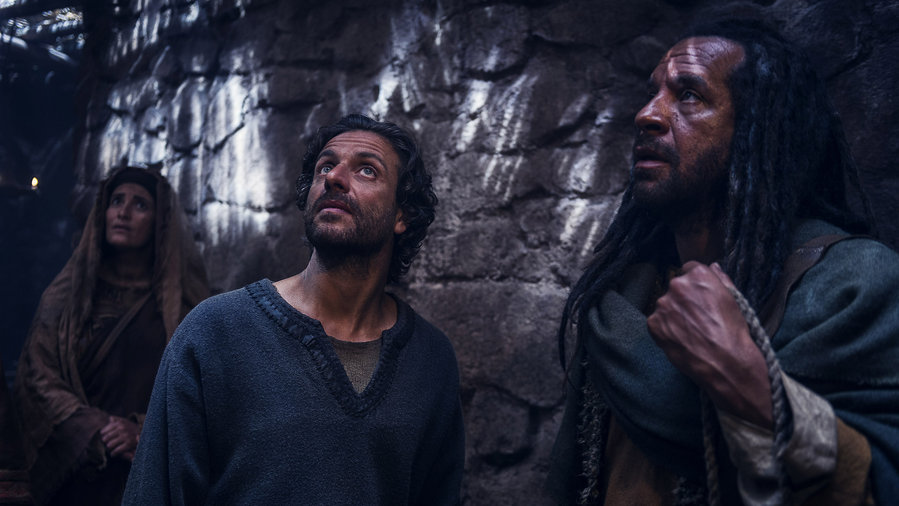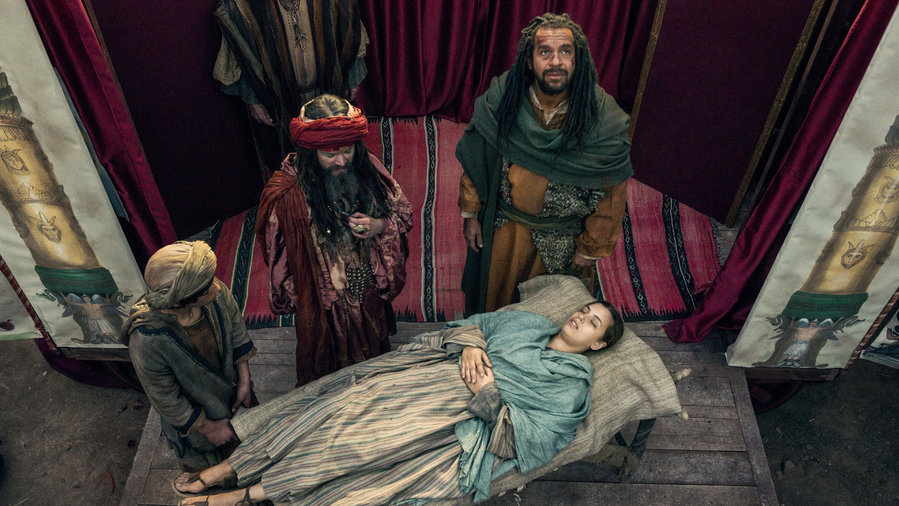Alissa’s Note: A.D. The Bible Continues began airing on Easter Sunday, and during its run, Peter Chattaway recaps episodes as they air. Recaps involve spoilers, especially if you’re not familiar with the Bible story.
Episode 7: 'The Visit'
 NBC
NBCA.D. The Bible Continues has been walking a fine line from its very first episode, balancing its adaptation of the book of Acts with fictitious subplots that are based very loosely on secular history. But the seventh episode just might be the first one in which the fictitious storyline overwhelms the biblical material; there is so little to work with here that it's hard to imagine anyone basing a Bible study on this installment. And to make matters worse, the historical fiction is utter bunk.
The central storyline in this episode is the arrival of the emperor Tiberius and his nephew Caligula in Jerusalem. To say this whole subplot is preposterous would be an understatement; the historical Tiberius spent most of the last decade or so of his life living on the island of Capri, off the coast of Italy, and he could barely be motivated to visit the Italian mainland, much less any of the Roman empire's more distant territories.
What's more, even if Tiberius was inclined to visit Pontius Pilate in person, it is doubtful that he would have made the trip inland, through hostile territory, towards Jerusalem; it would have made more sense to do business in Caesarea, the administrative centre on the Mediterranean coast.
 NBC
NBCThe episode actually hints at all these things, however inadvertently: Tiberius tells Pilate Judea is a "minor province," which makes you wonder why he thought it worthy of a personal visit in the first place, especially if he is thinking of removing Pilate from his post, while Pilate's wife Claudia tells Tiberius the best thing about Jerusalem is that it is only "one day's journey to our home on the coast." So why not meet there, then?
Anyone familiar with the legends and history surrounding these characters will also marvel at some of the missed opportunities here. For example, around this time, back in Italy, Tiberius had just executed a traitor named Sejanus who appears to have been an associate of Pilate's; you might think this would give Pilate all sorts of extra reasons to be apprehensive about Tiberius's visit, but the episode never brings it up.
Similarly, there is a legend that traces the origins of coloured Easter eggs to an encounter between Mary Magdalene and the emperor Tiberius—so when the Mary Magdalene of this series gets a job working in Pilate's palace, just in time for Tiberius's visit, you wonder if this episode might play on this legend somehow. But no, it doesn't (and Cornelius, who recognizes Mary Magdalene, tells her never to come back to the palace, so that might be the end of that).
 NBC
NBCThe biblical section of the episode is fairly brief, and covers Philip's visit to Samaria and his evangelism there, including the baptism of Simon the Magician, who wonders why becoming a Christian hasn't instantly given him the power to perform miracles like the ones Philip has performed (Acts 8:4-13). But this subplot is left hanging, and will presumably be resolved when Simon meets Peter in some future episode.
Meanwhile, Peter and the other apostles are left spinning their wheels: they gather, they hide, they even confront Saul in the street when he's alone, but nothing comes of the encounter. The impression you get is that the filmmakers wanted to give these characters something to do instead of just forgetting about them for an episode or two, the way they seem to have forgotten all about the Zealots for now. But the scenes with Peter and the others end up feeling like just so much narrative padding.
 NBC
NBCSaul, meanwhile, continues his persecution of the Christians even after Caiaphas tells him to cut it out for the duration of Tiberius's visit. (Caligula, for his part, doesn't mind the mayhem in the streets and personally chokes a Christian to death.) The episode ends with Caiaphas tricking Saul into thinking that Peter has gone to Damascus, just to get Saul out of the city. That's not exactly how Saul leaves Jerusalem in the Bible, but in any case, it seems pretty clear that we'll be witnessing a major turning point in the next episode.
Peter T. Chattaway writes about films in general, and Bible films in particular, at FilmChat.













